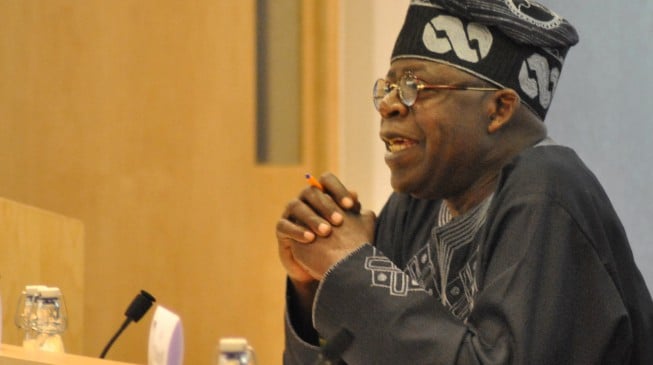 |
| Steve Ayorinde |
If the intention of the former Governor of Central Bank
of Nigeria, Prof. Charles Soludo, is to reduce the fun and entertainment that
characterize the ongoing campaigns and rallies in the country, he is not
succeeding. His acerbic treatise on this month’s general polls, titled Buhari
vs Jonathan: Beyond the Election, may have raised the bar of discussion and drew
various degree of responses from the main political parties as indeed
commentators. But it has not robbed the campaigns of colour and entertainment
verve.
At each mega rally, attention is given in equal measure to the manifesto
and plans of each party and to endorsements from artistes, with each party not
neglecting to allow its standard bearers some space to showcase their dancing
skills. While the ruling Peoples Democratic Party often loads its stage with
popular Nollywood stars and musicians from the South-East and South-South
geo-political zones, the All Progressives Congress responds in equal measure,
often parading the biggest names in the Fuji and hip-hop music scene. So moved
was APC’s presidential candidate, General Muhammadu Buhari, by the music of K1
at the Ibadan campaign rally last week that he attempted a dance. But before
auzubillahi could escape from anyone’s lips, the General called himself to
order, announcing that he could not recall the last time he danced in public.
But his lieutenants in the race are less self-conscious, often announcing their
arrivals on the podium by the pulsating sounds of Don Jazzy’s DoroBucci. Music,
fun and conviviality certainly appeal to both the purveyor of the broom and the
umbrella. However, the carnival atmosphere at our campaigns, often at a huge
cost, tends to confirm, on the one hand, the convivial, happy-go-lucky spirit
of the average Nigerian.
No rally appears complete, not even a street protest,
without a concert-like, celebratory colouration. But it also confirms, on the
other hand, the reason why a timely reminder about the weak state of our
economy, and in a way the basis for our collective aspirations as a sovereign
nation, should not be danced away on the altar of political exigency. Soludo’s
paper and his latest direct salvo on the Minister of Finance, Ngozi
Okonjo-Iweala, falls within the class of those timely reviews and reminders
about why we may not be as strong as we imagine and why our expectations ought
to be put in moderate perspective. I should quickly add that I’m not a big fan
of the former CBN governor. I do not think that his attempt at the
redenomination of the naira after the success of the banking consolidation was
well thought-out. This issue was one of the areas where I had once engaged
Soludo at a breakfast meeting on the sideline of the IMF/World Bank Autumn
Meetings in 2008. There was also the aspect of the unnerving suspicion that he
was aware of the bad shape of some of the banks that survived consolidation and
still decided to either feign ignorance or tacitly chose to encourage their
survival in a manner that could have injured the banking sector or the entire
economy if his successor, Lamido Sanusi Lamido, had not had the courage to
wield the big stick.
But Soludo’s flaws, no matter how damaging or
inconsequential, should not affect the timeliness and importance of
self-appraisal that his article represents. Even more important is the fact
that the disagreement with some of his policies cannot be sufficient a reason
to ignore his admonition on the state of our economy as Okonjo-Iweala would
want people to think. Soludo’s arguments are clear: neither Jonathan nor Buhari
would be able to deliver on their promises on the economy, especially if oil
prices remain below $60. The former CBN governor was on point in saying that
while both parties are promising El Dorado, which is a mirage, considering
current realities, they are missing the golden opportunity to sensitize the
citizenry about the enormous challenges ahead and the need to mobilize them for
the inevitable sacrifices they would soon be called upon to make. Even though
Business Day in his Wednesday edition has put an estimate to what it would cost
each party to execute its plans, both are way above what the government can
ever realize in revenue and loans. Soludo’s submission that without the dollar
or naira signs to it, what the two dominant parties are presenting to Nigerians
is nothing but a wish-list, becomes a food-for-thought, therefore. “They are
not telling us how much each of their promises will cost and where they will
get the money. None talks about the broken or near bankrupt public finance and
the strategy to fix,” he says. To be fair, Soludo did not spare either of the
parties. But his submissions are not unduly harsh or unjustified.
If the
Federal Government is evidently wobbly in its approach to running a sustainable
economy or convincing voters of its sincerity, the main opposition party ought
to be presenting a well-prepared, far better alternative that is rich in
figures and definitive in its promises. This is a bitter but needed admonition
not to jump into a pool of still water blindly. Stemming the tide of corruption
in public service, reducing external debt and blocking waste may be a good way
to begin a rescue measure, according to this Professor of Economics. But they
are not sufficient in delivering on all the promises being made, particularly
for a country whose economy rests largely on a single product. Grim as the
outlook of his paper might be, he is not unmindful of the fact that radical and
ingenious approach to governance, in addition to running an efficient and
accountable government, will go a long way in rebuilding the fortunes of this
prodigal nation that has frittered away much of its blessings. While we should
find Okonjo-Iweala’s latest response not to join issues with the former CBN
governor dodgy and unacceptable, particularly from one who claims to be
coordinating the economy, it is important to salute Soludo’s timely
intervention on the strength that matters of the economy is not like playing
ludo. You cannot gamble through it or dance your way round it.
*Steve Ayorinde is an award-winning journalist and former managing director/editor-in-chief, National Mirror newspapers.
Culled from TheCable
Culled from TheCable














